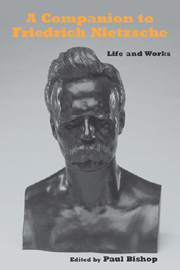Book contents
- Frontmatter
- Contents
- Acknowledgments
- A Note on Editions and Abbreviations
- Introduction
- Link to Nietzsche's Early Writings
- Link to The Birth of Tragedy
- Link to Untimely Meditations
- Link to Human, All Too Human
- Link to Daybreak
- Link to The Gay Science
- Link to Zarathustra
- Link to Beyond Good and Evil
- Link to On the Genealogy of Morals
- Link to The Case of Wagner and Nietzsche contra Wagner
- Link to Twilight of the Idols, The Anti-Christ, and Ecce Homo
- Link to the Nachlass
- Conclusion
- Notes on the Contributors
- Index
Link to On the Genealogy of Morals
Published online by Cambridge University Press: 05 February 2013
- Frontmatter
- Contents
- Acknowledgments
- A Note on Editions and Abbreviations
- Introduction
- Link to Nietzsche's Early Writings
- Link to The Birth of Tragedy
- Link to Untimely Meditations
- Link to Human, All Too Human
- Link to Daybreak
- Link to The Gay Science
- Link to Zarathustra
- Link to Beyond Good and Evil
- Link to On the Genealogy of Morals
- Link to The Case of Wagner and Nietzsche contra Wagner
- Link to Twilight of the Idols, The Anti-Christ, and Ecce Homo
- Link to the Nachlass
- Conclusion
- Notes on the Contributors
- Index
Summary
Of Nietzsche's publications to date (i.e., to 1886), Beyond Good and Evil (Jenseits von Gut und Böse) had enjoyed arguably the best critical reception. In a review for the Swiss journal Der Bund, Josef Victor Widmann described it as Nietzsche's “dangerous book” (gefährliches Buch), pointing out that the dynamite used in the construction of the Gotthardbahn, the railway line that traverses the Swiss Alps, always bore a black warning-flag to alert people to its danger — and that Nietzsche's book deserved a similar warning. Nietzsche was delighted by the review, both for commercial reasons (KSB 7, 249 and 256) and because, in essence, it said his book was dynamite (KSB 7, 251-52 and 258); in Ecce Homo, he would allude to Widmann's review and playfully apply his description of Beyond Good and Evil to himself: “I am not a man, I am dynamite” (Ich bin kein Mensch, ich bin Dynamit; EH “Why I Am a Destiny” §1; KSA 6, 365). Other reviews were positive, too, but Nietzsche's old friend, Erwin Rohde, was not impressed. The two friends were reunited when Nietzsche visited Leipzig again in 1886, but the encounters left both disappointed. Rohde told Franz Overbeck that there was “something totally uncanny” (etwas mir damals völlig unheimliches) about Nietzsche, “as if he came from a country where no one else lived” (als käme er aus einem Lande, wo sonst Niemand wohnt); for his part, Nietzsche wrote to Overbeck that Rohde's case simply proved that “the best go to seed in the atmosphere of the university”
- Type
- Chapter
- Information
- A Companion to Friedrich NietzscheLife and Works, pp. 251 - 254Publisher: Boydell & BrewerPrint publication year: 2012



